When it comes to city passes and travel cards, it’s usually fairly easy to figure out whether they would be worth it for you or not. For things like the Paris Pass or London Pass, they have a list of the most popular attractions and how much they cost, right there for you to see. The Swiss Travel Pass, however, is shrouded in mystery, or at least it was until I spent several days tracking down all of the prices and benefits.
A great many of the visitors and commenters on my popular page about where to go in Switzerland on a short visit are wondering whether the Swiss Travel Pass is a good deal. Embarrassingly, I’ve always had to answer that I found the pass too confusing to confidently advise people on. Now that has all changed, after literally days of research.
Note: This article was last updated in February, 2024.
Disclosure: This is a reader-supported website and some of the links are affiliate links where a small commission is paid to help keep this site going, but the cost to visitors is the same. The Swiss Travel Pass seems quite expensive at first, so it felt like it might be hard to get your money’s worth out of it. As it turns out, it’s pretty easy to get good value, and it’ll be a good deal for many visitors.
New in 2024
Prices increased an average of 5.9% from 2023 on the Swiss Travel Passes, but the Half Fare Card remains at CHF120, which is where it’s been for many years. Train fares in the country increased by similar percentages so the value is basically unchanged. There were no other notable changes to service or the included attractions and train routes.
>>>Buy the Swiss Travel Pass online
Where to stay in Interlaken and the Lauterbrunnen Valley
Since most people reading this will be visiting the Interlaken area and I get so many questions about it, I decided to write a detailed guide on which area to stay in while visiting this area.
>>>Where to stay in Interlaken or the Lauterbrunnen Valley in Switzerland
I included many huge photos in that post so readers will be able to get a better idea of what each place looks like and they are worth a look by itself.
>>>Lucerne or Interlaken: Which to visit and how long to stay?
The article just above will help you decide on how long to spend in each of Switzerland’s two best tourist areas.
Are you 100% sure where you want to go in Switzerland? This should help
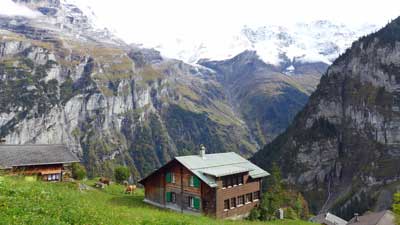
Zurich and Geneva are pleasant but dull. The good news is that Switzerland is packed with amazing sights and none of them are the big cities. If you aren’t 100% locked in yet, please read the article below and I think you’ll enjoy it.
Is the Swiss Travel Pass a good deal? Here's the short version
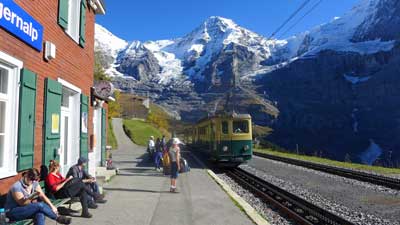
The bottom line is that the scenery, train journeys, and cable car rides in Switzerland are stunning and not found anywhere else in the world. They are also quite expensive if you pay for them one at a time. So no matter how you visit Switzerland, you are going to be paying quite a bit, or skipping the absolute best things that you’ve come there to see.
With good planning it’s quite easy to get great value out of a Swiss Travel Pass, but it might be a poor choice for those who don’t like to plan ahead. You can easily do a scenic train ride and a cable car in the same day, and still have time to do a scenic hike in the process.
First class or second class? Good news for most people
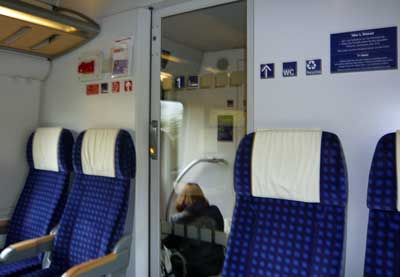
That said, Swiss Trains are literally the nicest in Europe and even the Second Class seats and carriages are nicer and roomier than trains in neighboring countries. The First Class seats are larger and nicer with only 3 across the cabin instead of 4, but honestly Second Class is perfectly comfortable for almost everyone.
Again, First Class on European trains like this is generally popular with business travelers where the company is paying and they need to get work done during the ride, and also senior citizens who don’t want to worry about a carriage full of backpackers. For most of the rest of us, Second Class is more than comfortable enough and the seat width and legroom compare to business-class airline seats. I’m a big and tall guy and I almost always travel in Second because it’s plenty comfortable enough and all the seats arrive at the same time anyway.
The longer you'll be in Switzerland, the better deal a Swiss Travel Pass will be
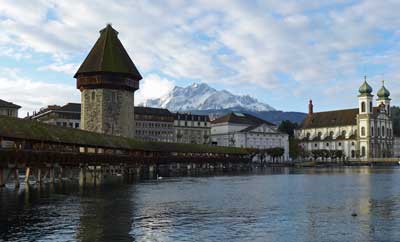
In other words, if you are staying 5 days or fewer, you have to do the math to determine your best option. But if you are spending even 6 or 7 days in Switzerland then the 6-day or 8-day Pass is almost guaranteed to be a great deal and your best choice. Once you have a Swiss Travel Pass you’ll absolutely love the ability to just hop on any train (excellent trains, always on time) and most boats and cable cars without having to worry about the cost. The per-day cost of an 8-day Pass even if you only use 6 of those days is about CHF65, and Switzerland is filled with amazing train rides and boats and cable cars that can get you that much value before noon each day.
Schilthorn (50% discount) and Jungfraujoch (25% discount) are cheaper with a Swiss Travel Pass
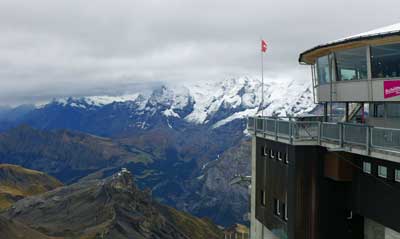
Both of those peak experiences are extraordinary and different from each other. Even so, compared to Jungfraujoch, Schilthorn is also faster and more comfortable on the way up and down. You can enjoy an excellent visit to Schilthorn in 4 hours or so (or a bit longer if you eat at the spinning Piz Gloria restaurant at the top), while a visit to Jungfraujoch requires closer to 6 hours.
NOTE: Schilthorn closes for maintenance for a week or two in late November most years.
Consider the Swiss Half-Fare Card instead
If you AREN’T going to be doing two or more of the long (and expensive) scenic train trips, you will get much better value out of the Swiss Half-Fare Card, which is explained a bit below.
Mt Rigi, near Lucerne, is 100% covered by the Swiss Travel Pass
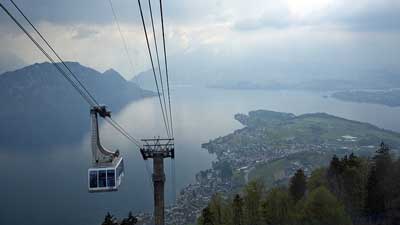
Is a Swiss Travel Pass right for you?
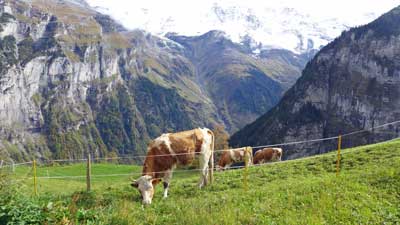
Most people only visit Switzerland for 5 or 6 days at most, so the 3-day and 4-day passes are the ones to focus on. But if you are staying for 8 days or more, those longer passes are almost certainly a great deal for you.
Long story short, if you plan on doing 2 of the more expensive scenic trains and the Jungfraujoch railway or the Schilthorn cable car, then the pass will save you money. Switzerland is expensive, but it’s worth it, and the travel pass can help make it a bit more affordable.
What the Swiss Travel Pass includes
- Free rail travel on normal trains and most scenic trains
- Discounted travel (about 50%) on popular tourist mountain trains
- Discounted travel (about 50%) on popular tourist cable cars
- Free travel on public transport in 75 towns and cities
- Free entry to around 500 museums in Switzerland
The Swiss Travel Pass covers the fare on the most popular scenic and panoramic trains. You can choose a normal seat in a regular carriage for no additional cost, but there is a supplement of CHF8 to CHF49 for a reserved seat in one of the special panorama carriages on these routes.
Prices of the 2024 Swiss Travel Pass
1st Class
- Adult 3-day Pass: CHF389
- Youth (4 to 25) 3-day Pass: 274
- Adult 4-day Pass: 469
- Youth (4 to 25) 4-day Pass: 330
- Adult 6-day Pass: 602
- Youth (4 to 25) 6-day Pass: 424
- Adult 8-day Pass: 655
- Youth (4 to 25) 8-day Pass: 469
- Adult 15-day Pass: 723
- Youth (4 to 25) 15-day Pass: 512
2nd Class
- Adult 3-day Pass: CHF244
- Youth (4 to 25) 3-day Pass: 172
- Adult 4-day Pass: 295
- Youth (16 to 25) 4-day Pass: 209
- Adult 6-day Pass: 379
- Youth (16 to 25) 6-day Pass: 268
- Adult 8-day Pass: 419
- Youth (16 to 25) 8-day Pass: 297
- Adult 15-day Pass: 459
- Youth (16 to 25) 15-day Pass: 328
Swiss Travel Pass Flex
This version costs a bit more, but you don’t have to use the travel days consecutively. It’s a great option for anyone who won’t be taking longer train rides each day.
- Adult 3 Flex days in 1 month (1st Class): CHF445
- Adult 3 Flex days in 1 month (2nd Class): 279
- Adult 4 Flex days in 1 month (1st Class): 539
- Adult 4 Flex days in 1 month (2nd Class): 339
- Adult 6 Flex days in 1 month (1st Class): 644
- Adult 6 Flex days in 1 month (2nd Class): 405
- Adult 8 Flex days in 1 month (1st Class): 697
- Adult 8 Flex days in 1 month (2nd Class): 439
- Adult 15 Flex days in 1 month (1st Class): 755
- Adult 15 Flex days in 1 month (2nd Class): 472
Where to buy the Swiss Travel Pass
The Swiss Half-Fare Card – A better option for many visitors
Far less confusing than the Swiss Travel Pass, you can instead get a Swiss Half-Fare Card, and it will be a better deal for many travelers. The price is lower and it’s much easier to do the math, and the discounts are greater on some things as well.
- Swiss Half-Fare Card for 30 days: Adults – CHF120 or US$129
What you get:
Those who buy the Swiss Half-Fare Card will get 50% discount on all trains, buses, and boats in Switzerland for up to 30 days, as well as 50% off all public transportation in 75 cities and towns.
>>>Buy the Swiss Half-Fare Card
Why the Half-Fare Card is a better deal for many
While the Swiss Travel Pass is a great deal for those doing many of the expensive scenic journeys and mountain sights within a few days, it’s not good value for those who are doing fewer of the expensive trips and/or those who are staying longer. Also, the Swiss Travel Pass only provides a 25% discount on the amazing Jungfraujoch Railway, which costs between CHF120 and CHF224 return depending on your starting point, while the Half-Fare Card provides a 50% discount.
The math is simple as well. You can just add up the cost of the trains, boats, and buses you’ll be taking while in Switzerland, and if the total is more than CHF240 or so, the Half-Fare Card will save you money.
Example itinerary:
- Zurich to Interlaken train (2nd Class): CHF50
- Schilthorn Cable Car: CHF112
- Jungfraujoch railway from Interlaken: CHF205
- Interlaken to Lucerne train (2nd Class): CHF33
- Mt Rigi roundtrip from Lucerne: CHF84
- Engelberg (near Lucerne) to Mt. Titlis Cable Car: CHF92
- Lucerne to Zurich train (2nd Class): CHF25
Total per person: CHF601
Total with Half-Fare Card (including price of card): CHF420.50
It would be tough to do all of those things in 4 days, although it is possible. If you bought a 4-day Swiss Travel Pass here is how it adds up:
4-Day Swiss Travel Pass: CHF259
Supplements for Schilthorn, Jungfraujoch, and Mt. Titlis: CHF203.25
Total cost: CHF462.25
Bottom line on the Swiss Half-Fare Card
Since the Half-Fare Card lasts 30 days and provides a larger discount on Jungfraujoch, it is better value for visitors who want to include that scenic top-of-Europe rail journey on their trip. The discounts also add up more quickly on Schilthorn and Mt. Titlis trips, just to name two examples, and you don’t have to take many longer rail journeys to get value out of the Half-Fare Card.
Swiss Saver Day Pass (A one-day unlimited travel pass)
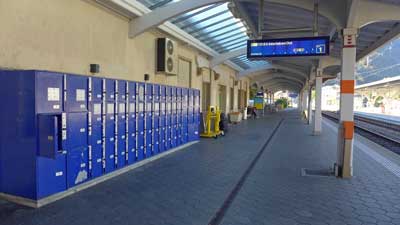
If you buy the Saver Day Pass at least 21 days in advance (and up to 60 days in advance) the 2023 cost is:
- 2nd Class (with Half Fare Card): CHF29
- 1st Class (with Half Fare Card): CHF82
- 2nd Class (with no Half Fare Card): CHF52
- 1st Class (with no Half Fare Card): CHF97
Once you research the normal cost of Swiss train fares you’ll see that the above prices are a very good deal for anyone riding more than 150 kilometers or so in a day. If you are just going, for example, from Zurich to Lucerne or Interlaken on a day, it’ll be cheaper to just buy that ticket individually. But if you are going from Geneva or Montreux to Interlaken or Lucerne then the Saver Day Pass will be much cheaper. Better still, you can use a Saver Day Pass to go from Interlaken to Geneva and back on the same day on the Goldenpass line and returning on the faster train through Bern, and it will still all be included for free.
If you don’t buy a Saver Day Pass at least 14 days in advance it’s more expensive, and if you only buy 1 to 3 days in advance it’s VERY expensive, so the key is to buy early. This is all confusing, but the Saver Day Pass should be a great option for many people only in Switzerland for one to three days.
Popular Swiss panorama scenic trains
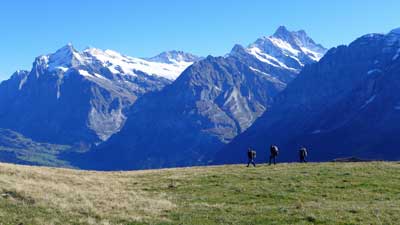
- Glacier Express
- Route: Zermatt to St. Moritz
- Train type: Panorama
- Journey time: 8 hours 3 minutes
- Distance: 291km
- 1st Class fare: CHF272
- 2nd Class fare: CHF159
- Compulsory seat reservation fee: CHF44 or 49
- Supplement for Swiss Pass holders: 13 to 33 for panorama carriage
- Bernina Express
- Route: Chur to Tirano and Lugano
- Train type: Panorama and bus
- Journey time: 4 hours 13 minutes and 3 hours 10 minutes
- Distance: 148km and 90km
- 1st Class fare: CHF113
- 2nd Class fare: CHF66
- Compulsory seat reservation fee: CHF32
- Supplement for Swiss Pass holders: 10 to 14 for panorama carriage
- GoldenPass Line
- Route: Lucerne to Montreaux
- Train type: Panorama
- Journey time: 5 hours 8 minutes
- Distance: 191 km
- Prestige Class fare: CHF131
- 1st Class fare: CHF96
- 2nd Class fare: CHF56
- Supplement for Swiss Pass holders: 8 to 15 for panorama carriage
- Gotthard Panorama Express (formerly Wilhelm Tell Express)
- Route: Lugano or Locarno to Lucerne
- Train type: Panorama and boat
- Journey time: 5 hours 21 minutes
- Distance: 182 km
- 1st Class fare: CHF164
- 2nd Class fare: CHF135
- Supplement for Swiss Pass holders: 39 to 49 for panorama carriage
- Swiss Chocolate Train
- Route: Montreux to Broc round trip
- Train type: Panorama or First Class
- Journey time: X hours X minutes
- Distance: 82 km
- 1st Class fare: CHF99
- 2nd Class fare: 89
- Supplement for Swiss Pass holders: 39
Popular Swiss scenic and theme trains
The scenic trains below are also extremely popular as sightseeing journeys rather than just as transportation, but can be used as both.
- Jungfraujoch round trip
- Route: Interlaken to Jungfraujoch
- Train type: special mountain train
- Journey time: 4 hours 41 minutes, round trip, plus time on top
- Distance: 73 km
- 1st Class fare: N/A
- 2nd Class fare: CHF224
- Supplement for Swiss Pass holders: 147 (so, a saving of CHF77)
- Gornergrat Railway
- Route: Gornergrat Railway
- Train type: Cog railway
- Journey time: 44 minutes return
- Distance: 10 km
- 1st Class fare: N/A
- 2nd Class fare: CHF90
- Supplement for Swiss Pass holders: 45
- Rigi round trip
- Route: Lucerne to Rigi
- Train type: Cog railway
- Journey time: 3 hours 25 minutes, plus time at the top
- Distance: 58 km
- 2nd Class fare: CHF78
- Supplement for Swiss Pass holders: None (this one is free with the pass)
- Mt Rigi Excursion (one-way and walk down)
- Route: Lucerne to Mt Rigi
- Train type: cogwheel train and/or cable car
- Journey time: 45 minutes up
- 1st Class fare: N/A
- 2nd Class fare: 49
- Supplement for Swiss Pass holders: 0
- Lotschberg Mountain Route and Centrovalli
- Route: Bern to Locarno
- Train type: Narrow gauge
- Journey time: 4 hours 40 minutes
- Distance: 212 km
- 1st Class fare: CHF158
- 2nd Class fare: CHF90
- Supplement for Swiss Pass holders: 5
- Jura round trip (Watchmaking Tour)
- Route: Neuchatel through Jura
- Train type: Regular
- Journey time: 3 hours 0 minutes
- Distance: 143 km
- 1st Class fare: CHF168
- 2nd Class fare: CHF108
- Supplement for Swiss Pass holders: 0
- Pre-Alpine Express
- Route: St. Gallen to Lucerne
- Train type: Regular
- Journey time: 2 hours 15 minutes
- Distance: 146 km
- 1st Class fare: CHF83
- 2nd Class fare: CHF47
- Supplement for Swiss Pass holders: 0
- Jura Foot Line
- Route: Basel to Geneva
- Train type: Regular
- Journey time: 2 hours 40 minutes
- Distance: 248 km
- 1st Class fare: CHF132
- 2nd Class fare: CHF75
- Supplement for Swiss Pass holders: 0
Popular Switzerland cable car rides
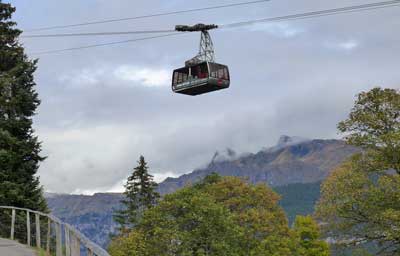
- Schilthorn
- Route: Stechelberg (Lauterbrunnen) to Schilthorn
- Train type: cable car
- Journey time: 1 hour
- 2nd Class fare: CHF108
- Supplement for Swiss Pass holders: 54
- Engelberg to Mt. Titlis cable car
- Route: Engelberg to Mt. Titlis
- Train type: cable car
- 2nd Class fare: CHF96
- Supplement for Swiss Pass holders: 46
The Swiss Travel Pass also includes free museum admission, but…
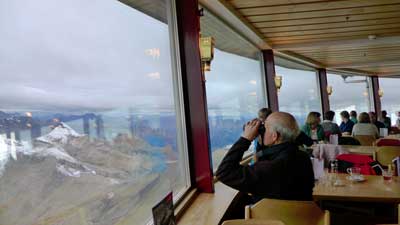
The problem is that the museums are only free on valid travel days, and almost no one would visit more than one or two museums with a Swiss Travel Pass. The trains and cable cars are so expensive that the pass gives very good value to cover those, so you don’t want to waste precious sightseeing time walking through a museum that only costs CHF10 anyway.
In other words, calculate the value of a Swiss Travel Pass on the travel savings only, and if you visit a museum here or there, then great. Most people are better off trying to squeeze in an additional train ride each day, and ignoring the museums. Switzerland is all about the outdoor scenery. As nice as the museums may be, they are not why you are there.
The pass includes free public transport in most Swiss cities
Similar to the free museum part of the offer, it’s best to ignore or minimize the value of free public transportation. It could be helpful in Zurich, but in most other Swiss tourist towns you won’t need much public transport. In fact, in Interlaken, each hotel or hostel guest automatically gets a card for free public transportation within the town (including between the two train stations).
So you might use a ride or two each day on public transport, but that won’t add up to much in terms of value of your Swiss Travel Pass.

Thanks for the help Roger!
Hello Roger, great article. I’m seeking some advice but frustrated finding someone very familiar with Switzerland and skiing. My wife and I are coming to Stuttgart 1/23-1-25, then wish to spend the rest of our time in Switzerland, flying back to US on 2/1. We wish to ski 2 days somewhere with a great ski town, then take some day trips, leaving out of Zurich. Do you have any advice on an itinerary? thanks in advance for your kind assistance. (or do you know of a resource that could assist with an itinerary?)
Bill,
I’m probably not your best resource when it comes to planning a Switzerland ski holiday, but I’ll try to help. Late January is prime ski season in the Swiss Alps and you’ve got lots of choices. For scenery alone the best spots are the Lauterbrunnen Valley, which is next to Interlaken, and Zermatt, which is more remote. Grindelwald and Murren are two mountain villages above the Lauterbrunnen Valley and both of them are loaded with ski lifts and hotels that cater to skiers. I’d at least plan on spending a few days in that area for sightseeing and you can probably do some great skiing as well.
Zermatt (home to the Matterhorn) is also a famous ski area and very scenic as well. If you wanted to experience two different places you might spend a few days there as well. At least that should give you some places to consider and look into more for specifics. -Roger
Hi
We are a family of 4 travelling to Vevey in May 2020.A couple with 2 kids ages 17 and 11.Visiting my bro so accommodation is not an issue .Got airfare very high.Want to know if swiss pass is required and will be worth.Travel dates 30 may to 10 june .Also provide with sites that offer some discount and best deals on rail pass
Kaneez,
As mentioned at the top of the article, the pricing for Swiss trains and attractions is high and confusing, so it’s impossible to say what the best option for each visitor is without knowing the specific things you’d want to do. The cheapest way would probably be to get a Half Fare Card for 3 of you and then get a free Swiss Family Card to get the 11-year-old in for free to everything. At half fare most of the better things are pretty reasonable and the card lasts for 30 days. If you plan on taking a lot of long and scenic train rides then the full Swiss Travel Pass might be a better deal, but you’d need to get a 15-day version and those are pretty expensive.
I’m not aware of any website that offers discounts on the Swiss Travel Pass or Half Fare Card. Those are both products offered by the official Swiss Rail company and the prices are fixed as far as I’ve seen. Best of luck with this. -Roger
My husband, 17 y.o., 2 younger kids (I.e. free with us) and I will be in Switzerland from April 9-17. We will be staying with friends outside of Berne. Our flight arrives in the afternoon on the 9th and leaves the afternoon of the 17th. That puts us at 9 days. We will be taking the train to and from Zurich for our flights and taking day trips to places like Interlaken, Lucerne, a town just across the border in Italy that still uses the Swiss train, maybe a tour boat ride and a cable car ride. The way I see it, we have 3 options – the 8 day Swiss pass leaving us to purchase full fares to Zurich on the way home, the 15 day pass or the half-fare card. What is your advice? Thank you so much!
Sarah,
It’s always hard to be confident with these choices unless I were to actually add up each trip under each pass or card, but my hunch is that the 8-day Swiss Travel Pass would be your best bet, and the one-way trip from Bern to Zurich Airport won’t cost nearly enough to make a 15-day pass worthwhile.
The other possible option to consider would be to buy a Half Fare Card and then get Saver Day Passes for each of the most expensive travel days. However, if you plan on taking longer train rides most or all days, the 8-day Swiss Travel Pass is almost certainly the best option. And once you have that pass you’ll find other things to do with it as you travel around each day. Let me know if you have any other specific questions. -Roger
Hi Roger,
Thanks for helping us in shaping our Swiss travel with your knowledge.
Indeed this site was as eyeopener for many of us.
my travel iternary looks like this
1. travelling from Paris – Montreux – stay at montreux
2. Montreux – Interlaken (golden pass line) – overnight interlaken
3. Jungfraujoch railway – overnight Interlaken
4. Schilthorn cable car – overnight interlaken
5. Visit Bern & return to interlaken – overnight Interlaken
6. Interlaken to Lucerne (golden pass line) – overnight Lucerne
7. Mt Ttitlis cable car , Chapel Bridge, Lion Monument – overnight Lucerne
8. Mt Rigi roundtrip , Lucerne lake cruise – overnight Lucerne
9. Lucrene to zurich
we planning to take 8 day swiss travel pass
please let us know your feedback
Regards
Navin
Navin,
I’m happy to try to help. Your itinerary looks excellent and well thought out. It’s hard to say whether an 8-day Swiss Travel Pass would save more or a Half Fare Card. My hunch is that the Travel Pass would save more and also allow more freedom. Even if it’s close, there is something really wonderful about having a travel pass that allows you to just hop on almost any train or cable car or boat. I think your plan looks great and I don’t have any other suggestions. Let me know if you have any questions. -Roger
Hello! First of all….must tell u that this blog is a blessing in disguise…Its so so confusing otherwise…Thanks for this..
Me and my extended family intend to visit Switzerland early september for 7/8 days.My queries are:
-Should I keep one base or two bases of stay and which should those be?
-Should I start from Geneva or Zurich?
-Planning to do atleast one scenic train and 1/2 other tourist spots.Any suggestions?
-Should i go for the travel pass/half fare pass or the day saver?
-I airbnb accomodation legal and a good option?
Sorry for asking you so many questions and thank you very very much in advance.Appreciate
S K,
I think most of your questions will be answered after at least scanning this article on where to go in Switzerland. My recommendations are to spend at least 3 nights in the Interlaken area and also at least 2 or 3 nights in Lucerne. You can also visit Zermatt or Bern if you’d like to visit a city.
Zurich Airport is closer to the main places so it’s usually best, but if you can get a much cheaper flight into Geneva it’s only a bit farther away.
The GoldenPass train from Lucerne to Montreux is lovely, but actually all trains going around Switzerland are very scenic.
For a 7 or 8-day visit you’ll almost certainly be best off with the 8-day Swiss Travel Pass. On a per-day basis it’s pretty cheap, especially considering how expensive things in Switzerland are. If you plan on getting one you can help plan your trip by focusing on the things that are fully included, such as the cable car and train up Mt. Rigi and the Lake Lucerne cruise.
Airbnbs are legal in Switzerland, but I’m not sure how many there are in prime locations. With an extended family they are probably your best option because normal hotel rooms in Switzerland are fairly expensive and fairly small. Have a great trip. -Roger
Hello Roger,
Thanks for such a long lasting and diligent blog.
We started investigating Swiss train travel a while ago and found it most confusing, as do all of your other enquirers. We then tried a spreadsheet approach to work out the best deal for our trip and have so far not succeeded.
Would it be a good idea for you or one of your computer smart mates to write a program that you put in the itinerary and it works out the best deal. Assuming that it does not exist, or will not for a while, are you able to comment on what pass or passes our proposed trip should use?
There is also a Jungfraujoch pass that does not get much comment. Is this of use when staying in Wengen?
fly into Zurich.
1. Train to Lucerne for 1 night.
2. Train up and down Mt Pilates then on to Wengen
3. Three nights in Wengen where we will train to Eigergletscher and hike the Eiger trail and train back from Apiglen to Wengen.
On another day we will go to Schilthorn and the other potter around the Lauterbrunnen valley.
Day 6 to Zermatt for two nights.
Day 7 catch train to Gornergrat and hike back.
Day 8 Zermatt to Montreux for three nights. when there we may train to Gruyere and have a boat trip before leaving Switzerland to go to Avignon.
Thanks in advance.
Regards
James McLaurin
James,
It’s indeed strange that Swiss travel options are so confusing, but I don’t have the time or resources to create a trip calculator to help, unfortunately. Switzerland is the only country in the world where normal prices are so high and “half price passes” are so affordable. When you add in the main Swiss Travel Pass and all of the smaller regional passes, it’s even more unique and complicated.
For nearly any Swiss visit of 8 days like yours I would assume that the 8-day Swiss Travel Pass is usually going to be your best option. The per-day price is quite affordable and you are certain to save a bundle. The only other one to consider would be just a Half Fare Card. That Jungfrau Pass could be good if you were only staying in that area (and traveling in summer), but I suspect that a longer pass or card will be better value.
What I’d probably do is assume you’ll get a 8-day Swiss Travel Pass and then see how many of your ideas are covered. For the ones that aren’t, you might look into alternatives that are. Unfortunately, the only way to know which way is best is to add them all up as you’ve attempted to do. Best of luck. -Roger
Hi Roger
We are currently planning the following trip to Switzerland in January and would appreciate your thoughts and comments as to whether we could improve it and also which travel pass is the most suitable. My initial investigations is leading me to the 8 day pass but I could easily be wrong.
Day 1 – arrive Basel and take the train to Grindelwald
Day 2 – Travel on the Jungfrau railway
Day 3 – Travel by train to Zermatt via Kandersteg
Day 4 – Travel on the Glacier Express from Zermatt to Chur
Day 5 – Travel on the Bernina Express to Poschiavo and return to Chur
Day 6 – Day in Chur
Day 7 – Return to Basel by train from Chur
Many thanks for your help with this.
Best
Andrew Harrison
Andrew,
I think you have it right. The 8-day Swiss Travel Pass is actually pretty cheap on a per-day basis and it looks like you’d be using it a LOT in your 7 days there. The Swiss Travel Pass only gives a 25% discount on the Jungfraujoch, but it should fully cover pretty much everything else on your list. Also, when you have the full pass you’ll find plenty of other boat rides and cable cars and so forth to use it on, since almost all of them are included and you’ll be able to just hop aboard. Have a great trip. -Roger
Hi Roger,
I am still confused with the Saver Day Pass.
When purchasing a train ticket on the SBB website, I would see a few options for outward journey as follow:
a) Point to point
b) Saver Day Pass
So, do I need a half fare card in order to purchase a ticket marked as Saver Day Pass? Or this is open to everyone who make advance purchase with or without half fare pass?
Thank you!
Sya,
Sorry for the delayed response. I was on the road. A Saver Day Pass is basically a 1-day Swiss Travel Pass. You can buy them at a discount if you also have a Half Fare Card, but you don’t need one of those to buy them. Let me know if you have any other questions. -Roger
Thanks for your response Roger. As a group of four 75 year old’s we are proposing to use the saver day passes as substitutes for the now defunct transfer ticket from Geneva Airport to Grindelwald and back taking in a cruise on lake Geneva or Thun as part of our arrival route now that you have confirmed lakes a inclusive, unfortunately we wont be issued with local passes until we reach the hotel. On a separate topic, we have to use Geneva Airport due to airline routing, are there any signs of the airline-onward-baggage-transfer-to-resort-facility being reinstated for next summer or thereafter via Geneva? (as is still available via Zurich). Dragging luggage with us has become extremely difficult due to now needing sticks to aid walking. Thanks for helping everyone to enjoy Switzerland at its best.
Dave,
Unfortunately I am not aware of what is going on with Geneva Airport and the luggage handling. I understand how dragging your own bags around would be a challenge. Fortunately, pretty much everything in Switzerland is very well built and well designed, so it’ll probably be a bit easier than you fear. Best of luck. -Roger